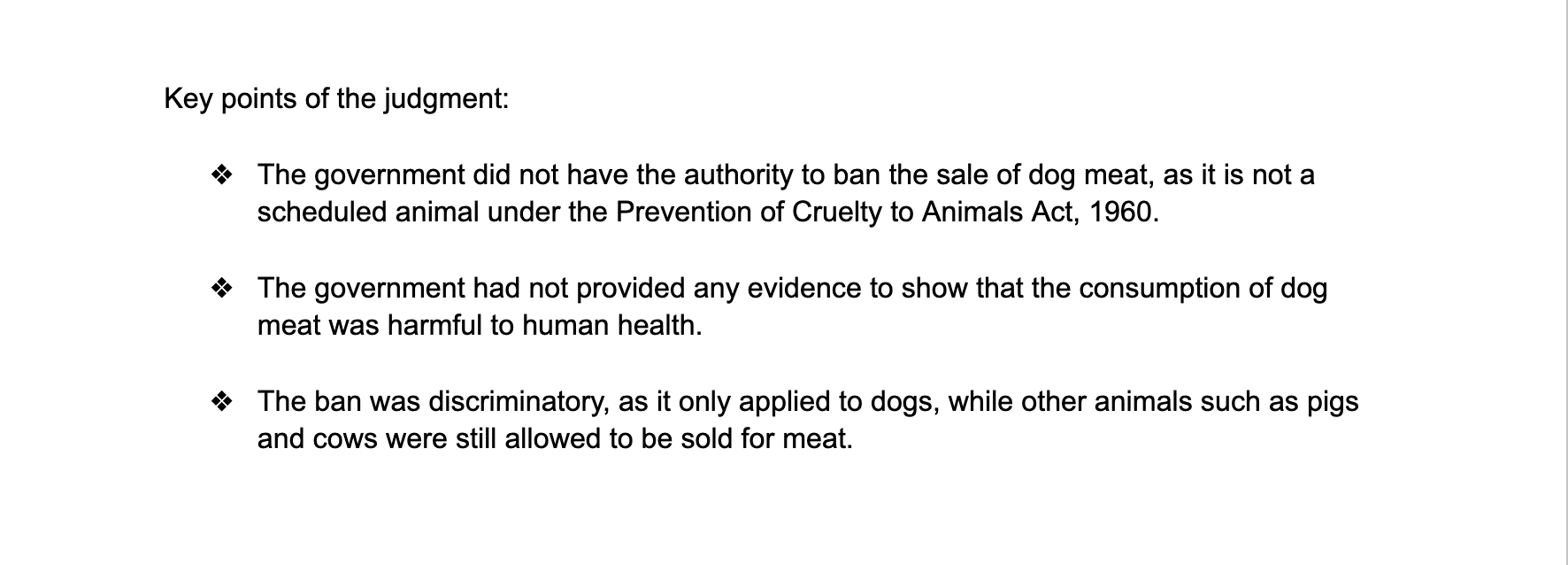The ban on dog meat was imposed by the Nagaland government in July 2020 following public outrage over the alleged killing of stray dogs for their meat
The Gauhati High Court has overturned a Nagaland government order that prohibited the commercial import, trading, and sale of dog meat in markets and dine-in restaurants.
Three individuals involved in supplying and selling dog meat in the state had contested the order.
Justice Marli Vankun ruled that the government lacked the authority to ban the sale of dog meat since it is not classified as a scheduled animal under the Prevention of Cruelty to Animals Act of 1960. The court said that the government provided no evidence showing that the consumption of dog meat posed a health risk to humans.
The ban on dog meat was initially imposed by the Nagaland government in July 2020 following public outrage over the alleged killing of stray dogs for their meat. While animal rights groups applauded the ban, it faced opposition from certain Naga tribes who have a traditional practice of consuming dog meat.
During hearing of the case, the counsel representing the petitioners argued that the Food Safety and Standards Act of 2006 does not prohibit the slaughter of animals.
“Eating dog meat is part of Naga culture and custom, as mentioned in the earliest ethnographical and anthropological accounts of the Nagas,” the petitioners said.
According to the petitioners, the FSS Act of 2006 defines food as any substance intended for human consumption, including the meat of animals not prohibited from being killed for human consumption by any law. They said that dog meat falls under this definition and asserted that the July 4, 2020 order lacks legal support and infringes upon their fundamental and legal rights under Articles 19 and 21 of the Constitution. They argued that their right to consume the food of their choice and earn a livelihood is being denied.
Shrieya Poropkarie, counsel for the Peoples for Animals and Animal Welfare, an organization chaired by Maneka Gandhi, stated that the draft Regulations of 2011 were made public before being presented to Parliament and subsequently enacted. She noted that there were no objections or protests during the public phase, which included inviting public comments. She argued that the petitioners cannot object to the definition of animals at this stage.
“Any other animal not mentioned in the regulation is considered unsafe for human consumption and cannot be regarded as food,” she said.
Poropkarie also cited various scientific research papers and articles that highlight the risks associated with the dog meat trade, including diseases like rabies and Trichinella infection, as well as increased antibiotic resistance.
“Dogs have been smuggled and brought into the market in Kohima, Nagaland in a deplorable state, tied in gunny bags with their mouths restrained for long periods without food or water,” she said. “In light of such conditions, the illegal killing of dogs, their importation and exportation, operation of dog farms, and confinement of dogs for the purpose of the dog meat trade are undoubtedly cruel and inflict unnecessary pain and suffering.”
After hearing the arguments, the Court identified the key issue as whether the Food Safety and Standards Authority of India had exceeded its delegated powers by issuing the circular. The court noted that dogs are not mentioned under the definition of “animals,” which is unsurprising given that the consumption of dog meat is limited to certain parts of the North Eastern states, and the idea of consuming dog meat is foreign to other regions of the country.

Based on its review of the FSS Act of 2006, the court said that the definition of food, as given in Section 3(j), encompasses any substance intended for human consumption, whether processed, partially processed, or unprocessed. The court added that the broad definition is inclusive enough to include dog meat since the Act does not define “animal” as stipulated in the regulation.
The court said that the ban could impact the petitioners’ ability to earn a livelihood adding that fundamental rights under Article 19(1)(g) and Article 21 of the Constitution encompass the right to earn a livelihood and the freedom to consume food of one’s choice.
The court said that the prohibition of the sale and consumption of dog meat, imposed solely by the executive branch of the government without the backing of legislation related to the trade and consumption of dog meat, should be set aside, despite the notification being claimed to align with a cabinet decision made on July 4, 2020.
The Court’s decision to overturn the ban is seen as a victory by those who believe that the Nagaland government should not interfere with individuals’ food choices. However, it is a setback for animal rights groups who had hoped the ban would reduce the number of stray dogs being killed for their meat.
Also Read: Deaths from rabies in India persist despite anti-rabies vaccine


















Add Comment